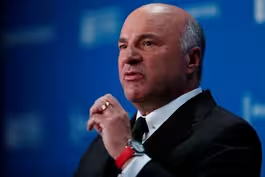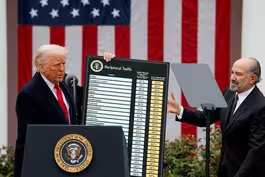
FDA head defends changes to COVID vaccine recommendations
Clip: 5/29/2025 | 9m 3sVideo has Closed Captions
FDA commissioner defends changes to COVID vaccine recommendations
In a significant shift this week, Health Secretary Robert F. Kennedy Jr. announced that COVID-19 vaccines will no longer be recommended for healthy children and pregnant individuals. That sparked concerns from some public health officials and medical professionals. But FDA Commissioner Dr. Martin Makary has defended the guidelines and joined Amna Nawaz to discuss why.
Problems playing video? | Closed Captioning Feedback
Problems playing video? | Closed Captioning Feedback
Major corporate funding for the PBS News Hour is provided by BDO, BNSF, Consumer Cellular, American Cruise Lines, and Raymond James. Funding for the PBS NewsHour Weekend is provided by...

FDA head defends changes to COVID vaccine recommendations
Clip: 5/29/2025 | 9m 3sVideo has Closed Captions
In a significant shift this week, Health Secretary Robert F. Kennedy Jr. announced that COVID-19 vaccines will no longer be recommended for healthy children and pregnant individuals. That sparked concerns from some public health officials and medical professionals. But FDA Commissioner Dr. Martin Makary has defended the guidelines and joined Amna Nawaz to discuss why.
Problems playing video? | Closed Captioning Feedback
How to Watch PBS News Hour
PBS News Hour is available to stream on pbs.org and the free PBS App, available on iPhone, Apple TV, Android TV, Android smartphones, Amazon Fire TV, Amazon Fire Tablet, Roku, Samsung Smart TV, and Vizio.
Providing Support for PBS.org
Learn Moreabout PBS online sponsorshipAMNA NAWAZ: In a significant shift this week,# Health Secretary Robert F. Kennedy, Jr.,## joined by FDA Commissioner Dr. Martin Makary and# NIH Director Dr. Jay Bhattacharya, announced that## COVID-19 vaccines will no longer be recommended# for healthy children and pregnant individuals.
That sparked concerns from some# public health officials and## medical professionals.
But Commissioner# Makary has defended the new guidelines.
He joins us now to discuss that# and other major health news.
Commissioner, welcome to the "News Hour."
DR. MARTY MAKARY, FDA Commissioner:# Good to .. AMNA NAWAZ: Thanks for being here.
So let's start with that vaccine announ.. an end run around CDC that doesn't currently# have a permanent director.
There's an advisory## council on vaccinations that usually weighs# in on these decisions.
They are scheduled to## meet in late June.
Why not wait for them to# meet before making any kind of announcement?
DR. MARTY MAKARY: So most of America has# said no to the COVID booster last year.## About 85 percent of health care workers# refused the COVID booster last year.
And## very few children are getting the COVID booster.
For 88 percent of children, their parents said# no to the COVID booster.
So we can't have this## huge disconnect.
And the reality is people# want to either see more data or they have## some concerns.
And so we need to provide that# data for the public to make the case.
Right now,## when we came into office, there was this# absolute universal recommendation at the CDC.
And so the secretary consulted with a number# of physicians and decided that he wanted to## turn that decision back to a physician and the# patient.
And we would be more in line with Europe,## because, in the U.K., for example, they only# recommend the COVID booster if you're 75 years## of age and high-risk.
Or, in France,# it's 80 years of age and high-risk.
So we're really getting closer to the European## model.
And then the idea that you need a# COVID booster every year in perpetuity... DR. MARTY MAKARY: ... that is, a young baby born# today needs 80 shots in her average lifetime,## that was a theory, a theory that's not supported# with any randomized controlled trial data.
AMNA NAWAZ: So we know the uptake# has been low, as you mentioned,## but was there science and data behind this, or# was it just a decision to end the recommendation?
DR. MARTY MAKARY: Well, that's exactly the# problem, is that we don't have the data to## support that repeat vaccination booster strategy# every year in perpetuity.
If you get a hepatitis## A vaccine, it's one shot.
If you get a hepatitis# B or MMR, it's two, depending on the age group.
And so the idea that you need 80 shots in# your lifetime in the average lifespan of## a woman for the COVID booster is a theory# that's unsubstantiated.
Some have concerns.## there are still people who claim vaccine# injury.
I have heard of people who have## died from the vaccine.
It's rare, but# these are questions that the public has.
And so, at the FDA, we have done our job# to put out guidance in "The New England## Journal of Medicine" last week.
And that guidance# basically says, for young, healthy individuals,## we'd like to see -- this is a good time to check# in with a clinical trial to find whether or not## we should be pushing this, because the worst# thing you can do in public health is to put## out an absolute universal recommendation with such# urgency when the data really doesn't support it.
And the reality is, the data is mixed.
AMNA NAWAZ: I just want to show,## say too that the vaccine was proven.. DR. MARTY MAKARY: Four and five# years ago, four or five years ago.
(CROSSTALK) AMNA NAWAZ: Sure.. DR. MARTY MAKARY: In the first dose, yes.
AMNA NAWAZ: Ther.. momentum overseas, has now landed in the States.
Are you anticipating a summer uptick?# And if people choose to get the booster,## if they want to get it now, what does that# mean?
They have to pay for it out of pocket?
DR. MARTY MAKARY: Well, that's up to# every individual insurance company.
Again, vast majority of Americans have said no to# the COVID booster.
For those who want to get it,## they will be able to get it.
They're# still going to be vaccines available.
AMNA NAWAZ: But if it's not recommended,## it's likely not going to be# covered by insurance, correct?
DR. MARTY MAKARY: That's up to# insurance companies.
I mean,## I would love some cancer therapies to be# covered by certain insurance compan.. and they have chosen not to.
So I'm -- we're# going to turn this decision back to patients## and their doctors.
We're going to get# more in line with where the public is.
The sort of absolutism of you must get your COVID# shot every year, even if you're a young, healthy,## a 12-year-old girl, that disconnect, it's not# healthy to be that disconnected from the public.## And the reality is, we'd like to see a clinical# trial supporting that repeat booster strategy.
AMNA NAWAZ: I want to ask you about some# reporting just today from the news organization## NOTUS about that landmark MAHA report you put out# recently, the Make America Healthy Again report.
AMNA NAWAZ: They found that it cited a number# of sources that don't appear to exist at all,## at least one scientist's name included# on a paper she says she never wrote.
When we checked on the report later# today, it looked like it had been## updated.
Some of those false sources# and names were removed.
But what do## you want people to know about how that bad# information got in there in the first place?
DR. MARTY MAKARY: Well, there's# over 500 references and citations## in that report.
It's an incredible report.
Look, I have written medical journal# studies in the peer review literature and## some of the citations may not be perfect# in the way that they're described there.
AMNA NAWAZ: But do you include citations that# don't exist for sources that don't exist?
DR. MARTY MAKARY: I haven't# double-checked those citations,## but I can tell you that the content of that MAHA# Commission report is amazing... because now we're talking about# microplastics and pesticides and## seed oils and the fact that 70 percent of# the food consumed by kids is ultra-processed.
I don't think our obesity, diabetes epidemic# in children is a willpower problem.
I don't## think it's their fault.
I think this is# something we are doing to kids.
And this## report changes the entire discussion in health,# because we can talk about Medicare payment and## states and site-neutral payments, which# is a reform that Mehmet Oz has put forth.
But the ultimate driver of our health care# costs in America, of our health care crisis## and the affordability crisis and the health# disparities that result is the worsening## health of the population.
And we have not been# talking about the health of the population.
It has been a 50-year failure of American# health care.
American medicine is amazing,## high, sophisticated operations in... AMNA NAWAZ: Yes.
DR. MARTY MAKARY..
But when it comes to the health of population,# it has been a 50-year failure.
And no one has## talked about root causes until this MAHA# Commission report.
It's unbelievable.
AMNA NAWAZ: And I know it is a priority for you# on this message, but to get back to the report... AMNA NAWAZ: ... if you want people to# trust what's in it, and there were false## sources and scientists who didn't work on these# papers, are you worried people won't trust it?
DR. MARTY MAKARY: Every one of those citations## that I read and every line# of that report was solid.
Now... AMNA NAWAZ: Exce.. DR. MARTY MAKARY: I took a hard look at that# report, and I thought, thi.. game-changing discussion that# for the first time in history## is talking about the fact that 40 percent# of American kids have a chronic disease.
What that means for the future of American# health care is very concerning.
And we can't## keep blaming kids for this problem.# At the FDA, we're doing our part of## that report.
We have taken action to remove# all nine petroleum-based food dyes from the## food supply so that kids don't have these# petroleum-based chemicals in their system.
We're doing an inventory of all chemicals,# including the 1,000-plus chemicals banned in## Europe that appear in the U.S. food supply.
Why?# And so we're asking big questions on root causes## that we have never asked before.
We have got to# talk about school lunches, not just chemotherapy.
DR. MARTY MAKARY: We have got to talk# about activity and chemicals and light## exposure in children, circadian rhythms.# All of it's in the report.
We can't just## keep talking about having every kid on Ozempic.
We're not on a good path, and this agenda, I# think, is laid out beautifully in the MAHA report.
AMNA NAWAZ: Commissioner, I want# to know what you're not sharing how## those false sources got in there,# but you're asking people to tr.. the information in there regardless.
We# can talk about that more another time.
I do want to ask you, though, about the last# time we talked.
I asked you about the medication## abortion mifepristone.
You said you had no plans# to pull access for that.
You were waiting to see## more data coming in to review it to see if you# make a decision or not.
Since we last spoke, have## you seen any additional information that tells# you have to make a decision one way or the other?
DR. MARTY MAKARY: I still have the same# view I had when we had that discussion,## and that is I have got no preconceived# plans to take action that drug.
We are constantly looking at new data as# it comes in, and I think we should.
I mean,## let's say there's a drug-drug# interaction that pops up in big## data analyses.
That's something that we# need to look at and pay attention to.
AMNA NAWAZ: You have described# yourself as a data guy, though.
DR. MARTY MAKARY: I'm a science guy.
AMNA NAWAZ: Will you hold up the# doze.. on the medication abortion mifepristone# over new information that comes in now?
DR. MARTY MAKARY: We have to look at all# data.
You can't say there's a sacred cow## thing that makes us be blind to certain# data, and that's for the same reason we are## at the FDA are saying in "The New England# Journal of Medicine" that we want to see## a clinical trial to support the infinite# booster strategy for young healthy people.
AMNA NAWAZ: FDA Commissioner Dr.# Marty Makary, thank you for your time.
DR. MARTY MAKARY: Thanks, Amna.
AMNA NAWAZ: We appreciate you being here.
How Israel is responding to U.S. proposals to pause Gaza war
Video has Closed Captions
Clip: 5/29/2025 | 5m 11s | How Israel is responding to latest U.S. proposals to pause war in Gaza (5m 11s)
Immigration attorney weighs in on Trump's deportations
Video has Closed Captions
Clip: 5/29/2025 | 7m 21s | Immigration attorney weighs in on Trump's deportations and court rulings against him (7m 21s)
Kevin O’Leary on Trump's trade war and battle with Harvard
Video has Closed Captions
Clip: 5/29/2025 | 6m 48s | Kevin O’Leary on Trump's trade war and battle with Harvard (6m 48s)
Met opens Arts of Oceania galleries showcasing Pacific works
Video has Closed Captions
Clip: 5/29/2025 | 7m 54s | The Met opens reimagined Arts of Oceania galleries showcasing works from the Pacific (7m 54s)
News Wrap: Trump and Fed Chair Powell meet at White House
Video has Closed Captions
Clip: 5/29/2025 | 5m | News Wrap: Trump and Fed Chair Powell meet at White House (5m)
Provision in GOP bill puts millions at risk of losing SNAP
Video has Closed Captions
Clip: 5/29/2025 | 6m 32s | Provision in GOP budget bill puts millions at risk of losing SNAP benefits (6m 32s)
What's next for Trump's tariffs amid legal back and forth
Video has Closed Captions
Clip: 5/29/2025 | 4m 17s | What's next for Trump's tariffs amid legal back and forth (4m 17s)
Providing Support for PBS.org
Learn Moreabout PBS online sponsorshipSupport for PBS provided by:
Major corporate funding for the PBS News Hour is provided by BDO, BNSF, Consumer Cellular, American Cruise Lines, and Raymond James. Funding for the PBS NewsHour Weekend is provided by...


















